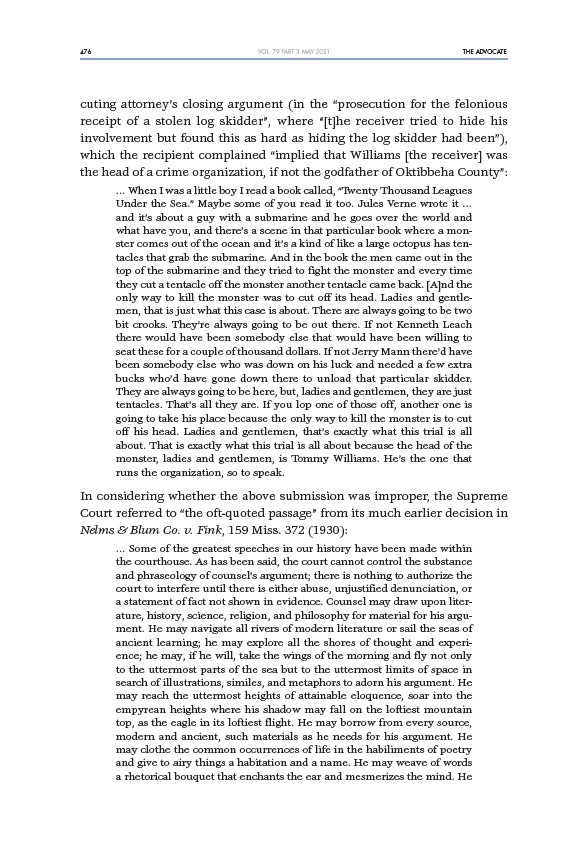
476 THE ADVOCATE
VOL. 79 PART 3 MAY 2021
cuting attorney’s closing argument (in the “prosecution for the felonious
receipt of a stolen log skidder”, where “the receiver tried to hide his
involvement but found this as hard as hiding the log skidder had been”),
which the recipient complained “implied that Williams the receiver was
the head of a crime organization, if not the godfather of Oktibbeha County”:
… When I was a little boy I read a book called, “Twenty Thousand Leagues
Under the Sea.” Maybe some of you read it too. Jules Verne wrote it …
and it’s about a guy with a submarine and he goes over the world and
what have you, and there’s a scene in that particular book where a monster
comes out of the ocean and it’s a kind of like a large octopus has tentacles
that grab the submarine. And in the book the men came out in the
top of the submarine and they tried to fight the monster and every time
they cut a tentacle off the monster another tentacle came back. And the
only way to kill the monster was to cut off its head. Ladies and gentlemen,
that is just what this case is about. There are always going to be two
bit crooks. They’re always going to be out there. If not Kenneth Leach
there would have been somebody else that would have been willing to
seat these for a couple of thousand dollars. If not Jerry Mann there’d have
been somebody else who was down on his luck and needed a few extra
bucks who’d have gone down there to unload that particular skidder.
They are always going to be here, but, ladies and gentlemen, they are just
tentacles. That’s all they are. If you lop one of those off, another one is
going to take his place because the only way to kill the monster is to cut
off his head. Ladies and gentlemen, that’s exactly what this trial is all
about. That is exactly what this trial is all about because the head of the
monster, ladies and gentlemen, is Tommy Williams. He’s the one that
runs the organization, so to speak.
In considering whether the above submission was improper, the Supreme
Court referred to “the oft-quoted passage” from its much earlier decision in
Nelms & Blum Co. v. Fink, 159 Miss. 372 (1930):
… Some of the greatest speeches in our history have been made within
the courthouse. As has been said, the court cannot control the substance
and phraseology of counsel’s argument; there is nothing to authorize the
court to interfere until there is either abuse, unjustified denunciation, or
a statement of fact not shown in evidence. Counsel may draw upon literature,
history, science, religion, and philosophy for material for his argument.
He may navigate all rivers of modern literature or sail the seas of
ancient learning; he may explore all the shores of thought and experience;
he may, if he will, take the wings of the morning and fly not only
to the uttermost parts of the sea but to the uttermost limits of space in
search of illustrations, similes, and metaphors to adorn his argument. He
may reach the uttermost heights of attainable eloquence, soar into the
empyrean heights where his shadow may fall on the loftiest mountain
top, as the eagle in its loftiest flight. He may borrow from every source,
modern and ancient, such materials as he needs for his argument. He
may clothe the common occurrences of life in the habiliments of poetry
and give to airy things a habitation and a name. He may weave of words
a rhetorical bouquet that enchants the ear and mesmerizes the mind. He